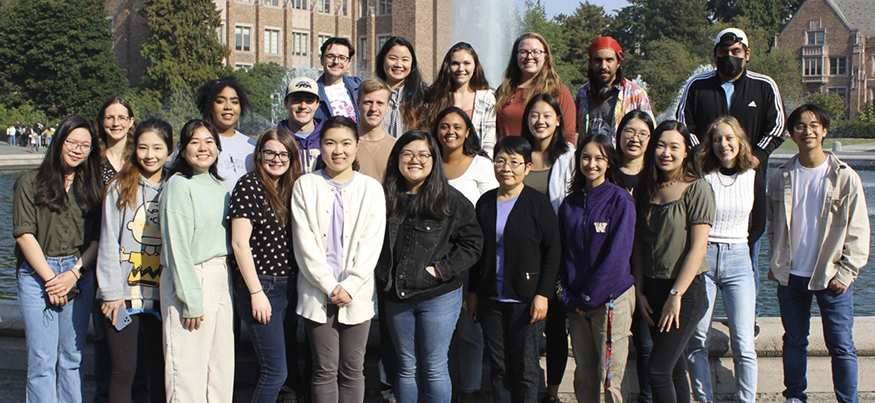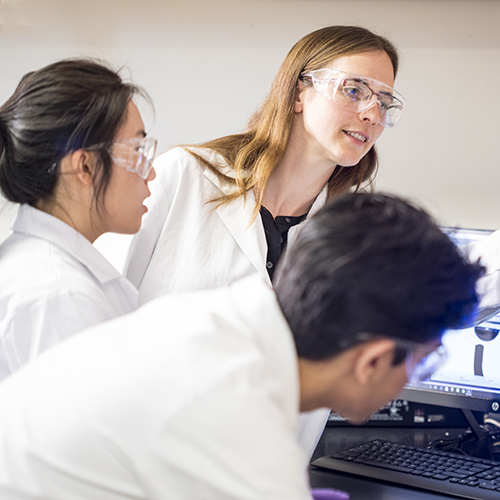
Undergraduate researchers are an important part of Ashleigh Theberge’s chemistry laboratory at the University of Washington. Theberge, UW associate professor of chemistry, is co-principal investigator of the Theberge Group lab, which invents bioanalytical chemistry tools to improve healthcare and advance knowledge of chemical mechanisms in the body.
Here Theberge shares her thoughts about involving undergraduate students in the lab’s many research projects.
Why do you like having undergraduates in your lab?
I like it for lots of reasons. One, I started my research journey early on and want to be part of the system of encouraging other people and providing opportunities for them to learn from more senior group members. But I also see it as a way for students to share their creativity. We're not just taking them under our wing and teaching them. They show us a lot too. An undergrad can be just as creative or productive as a principal investigator. We've had undergrads be first author on papers based on ideas they had. They've been a big part of our research from day one.

How many researchers in your lab are undergraduates?
The lab usually has about 30 to 40 researchers, including about 12 to 20 undergraduates. At any given time, the group might be about half undergrads.
That’s a lot of undergraduate students to supervise. How do you manage that?
We don't have a hierarchy in our lab. It's not like every undergrad reports to me. We discovered that we could scale things more by having experienced undergrads mentor other undergraduates in addition to mentoring from graduate students and postdocs and staff. We could never bring on so many undergrads if our structure was a pyramid with me at the top.
What qualities do you look for in undergraduate researchers?
We don't require previous research experience — I mean, everyone has to start somewhere — but we do look at previous work experience. If somebody's worked in a restaurant or a retail job or lab job, that shows that they can show up and execute things. So any level of work experience is viewed positively. But not everybody even has that, and that's fine. We do generally ask for their transcript, but we don’t always weigh that super heavily. Students who come to us right out of high school may not have a transcript. We've also had a large number of really successful transfer students start in the lab right after arriving at the UW from community colleges; all of these students went on to PhD programs, biomedical research jobs, or medical school after graduating.
Reach out to many labs and keep reaching out. If it's 'no' one quarter, it might be 'yes' the next quarter. People's project needs and openings change all the time.
What is the time commitment for undergraduates in your lab?
We ask for a 15 to 20 hour a week commitment for at least six quarters. It's a lot. Obviously during exams, scholastics come first. We don't necessarily expect this many hours every single week.
That’s a real commitment. Are the students paid?
Most are not. During the academic year they can take research credit. During the summer we do have a limited number of funded positions. We also help them apply for fellowships like the Mary Gates Research Scholarship. And we’ve had several Washington Research Foundation (WRF) or Levinson Fellows and some National Institutes of Health (NIH) supplements to fund undergraduates. We've also had students funded on summer scholarships sponsored by donors to the Department of Chemistry, and we are very grateful to donors who contribute these funds. We basically look for resources anywhere we can to fund undergraduates, but unfortunately we cannot fund all of them. I wish we could.
Can you describe the application and hiring process for undergraduate researchers in your lab?
When I get an email from a student expressing interest in the lab, I forward it to an undergraduate who keeps track of prospective undergraduates. That person will make sure that we have the applicant’s CV and other information. Then any group member can look at that information when they need another undergraduate researcher. Often it is an experienced undergrad who interviews students for the lab.
Any other advice for undergrads seeking a lab research opportunity?
Reach out to many labs and keep reaching out. If it's 'no' one quarter, it might be 'yes' the next quarter. People's project needs and openings change all the time.
The Theberge Group's website provides an overview of their research. The lab's recent research has been featured in Perspectives, the UW College of Arts & Sciences newsletter and UW Chemistry Magazine.
Check out Department of Chemistry scholarship opportunities, including summer research awards.
